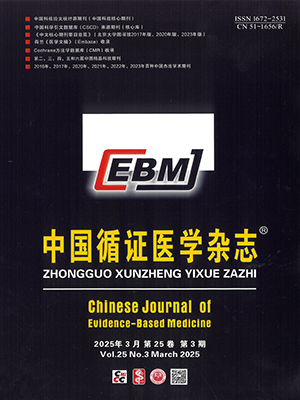| 1. |
Liu X, Faes L, Kale AU, et al. A comparison of deep learning performance against health-care professionals in detecting diseases from medical imaging: a systematic review and meta-analysis. Lancet Digit Health, 2019, 1(6): e271-e297.
|
| 2. |
Vasey B, Ursprung S, Beddoe B, et al. Association of clinician diagnostic performance with machine learning-based decision support systems: a systematic review. JAMA Netw Open, 2021, 4(3): e211276.
|
| 3. |
Freeman K, Geppert J, Stinton C, et al. Use of artificial intelligence for image analysis in breast cancer screening programmes: systematic review of test accuracy. BMJ, 2021, 374: n1872.
|
| 4. |
Keane PA, Topol EJ. With an eye to AI and autonomous diagnosis. NPJ Digit Med, 2018, 1: 40.
|
| 5. |
喻佳洁, 陕飞, McCulloch P, 等. 外科创新技术/器械临床研究方法学—IDEAL框架与推荐系列文章之一: IDEAL框架与推荐介绍. 中国胸心血管外科临床杂志, 2021, 28(2): 131-136.
|
| 6. |
喻佳洁, Hirst A, McCulloch P, 等. 外科创新技术/器械临床研究方法学—IDEAL框架与推荐系列文章之二: IDEAL报告规范解读. 中国胸心血管外科临床杂志, 2021, 28(3): 263-270.
|
| 7. |
Collins GS, Moons KGM. Reporting of artificial intelligence prediction models. Lancet, 2019, 393(10181): 1577-1579.
|
| 8. |
Sounderajah V, Ashrafian H, Aggarwal R, et al. Developing specific reporting guidelines for diagnostic accuracy studies assessing AI interventions: the STARD-AI steering group. Nat Med, 2020, 26(6): 807-808.
|
| 9. |
Liu X, Cruz Rivera S, Moher D, et al. Reporting guidelines for clinical trial reports for interventions involving artificial intelligence: the CONSORT-AI extension. Lancet Digit Health, 2020, 2(10): e537-e548.
|
| 10. |
Cruz RS, Liu X, Chan AW, et al. Guidelines for clinical trial protocols for interventions involving artificial intelligence: the SPIRIT-AI extension. Nat Med, 2020, 26(9): 1351-1363.
|
| 11. |
Vasey B, Nagendran M, Campbell B, et al. Reporting guideline for the early stage clinical evaluation of decision support systems driven by artificial intelligence: DECIDE-AI. BMJ, 2022, 377: e070904.
|
| 12. |
Moher D, Schulz KF, Simera I, et al. Guidance for developers of health research reporting guidelines. PLoS Med, 2010, 7(2): e1000217.
|
| 13. |
Dias R, Torkamani A. Artificial intelligence in clinical and genomic diagnostics. Genome Med, 2019, 11(1): 70.
|
| 14. |
International Organization for Standardization. Information technology - artificial intelligence (AI) - bias in AI systems and AI aided decision making (ISO/IEC TR 24027:2021). 2021.
|
| 15. |
US Food and Drug Administration (FDA). Clinical decision support software: draft guidance for industry and Food and Drug Administration staff. 2019.
|
| 16. |
Vasey B, Nagendran M, Mcculloch P. DECIDE-AI 2022. 2022.
|
| 17. |
Hopper AN, Jamison MH, Lewis WG. Learning curves in surgical practice. Postgrad Med J, 2007, 83(986): 777-779.
|
| 18. |
Bilbro NA, Hirst A, Paez A, et al. The IDEAL reporting guidelines: a Delphi consensus statement stage specific recommendations for reporting the evaluation of surgical innovation. Ann Surg, 2021, 273(1): 82-85.
|
| 19. |
Abràmoff MD, Lavin PT, Birch M, et al. Pivotal trial of an autonomous AI-based diagnostic system for detection of diabetic retinopathy in primary care offices. NPJ Digit Med, 2018, 1: 39.
|
| 20. |
International Organization for Standardization. Ergonomics of human-system interaction-usability methods supporting human-centred design. ISO/TR 16982, 2002.
|
| 21. |
International Organization for Standardization. Ergonomics of human-system interaction-part 11: usability: definitions and concepts. ISO 9241-11, 2018.
|
| 22. |
International Electrotechnical Commission. Medical devices-part 1: application of usability engineering to medical devices. IEC 62366-1, 2015.
|
| 23. |
International Electrotechnical Commission. Medical devices-part 2: guidance on the application of usability engineering to medical devices. IEC TR 62366-2, 2016.
|
| 24. |
International Electrotechnical Commission. Medical devices-part 2: guidance on the application of usability engineering to medical devices-amendment 1. IEC 62366-1, 2015.
|
| 25. |
Wu G, Yang P, Xie Y, et al. Development of a clinical decision support system for severity risk prediction and triage of COVID-19 patients at hospital admission: an international multicentre study. Eur Respir J, 2020, 56(2): 2001104.
|
| 26. |
Li Z, Zhang X, Ding L, et al. Rationale and design of the GOLDEN BRIDGE II: a cluster-randomised multifaceted intervention trial of an artificial intelligence-based cerebrovascular disease clinical decision support system to improve stroke outcomes and care quality in China. Stroke Vasc Neurol, 2024.
|
| 27. |
李健斌, 江泽飞. 中国临床肿瘤学会人工智能决策系统的建立与应用. 中华医学杂志, 2020, 100(6): 411-415.
|
| 28. |
Boel A, Navarro-Compán V, Landewé R, et al. Two different invitation approaches for consecutive rounds of a Delphi survey led to comparable final outcome. J Clin Epidemiol, 2021, 129: 31-39.
|
| 29. |
Sujan M, Furniss D, Grundy K, et al. Human factors challenges for the safe use of artificial intelligence in patient care. BMJ Health Care Inform, 2019, 26(1): e100081.
|




